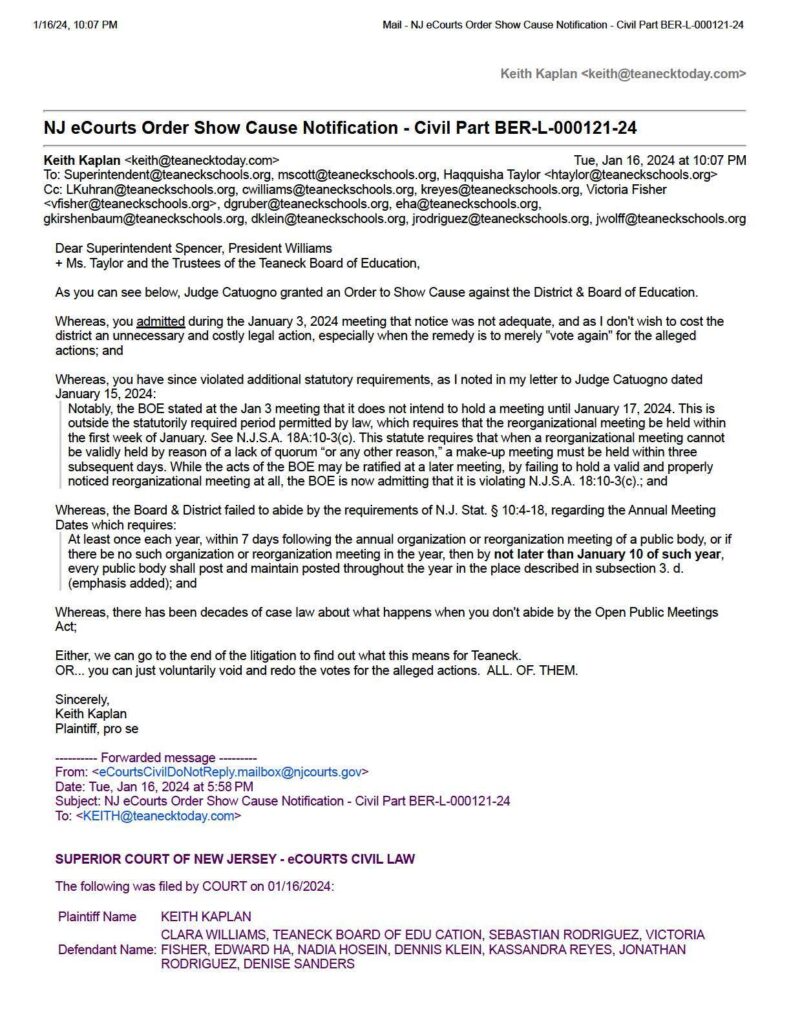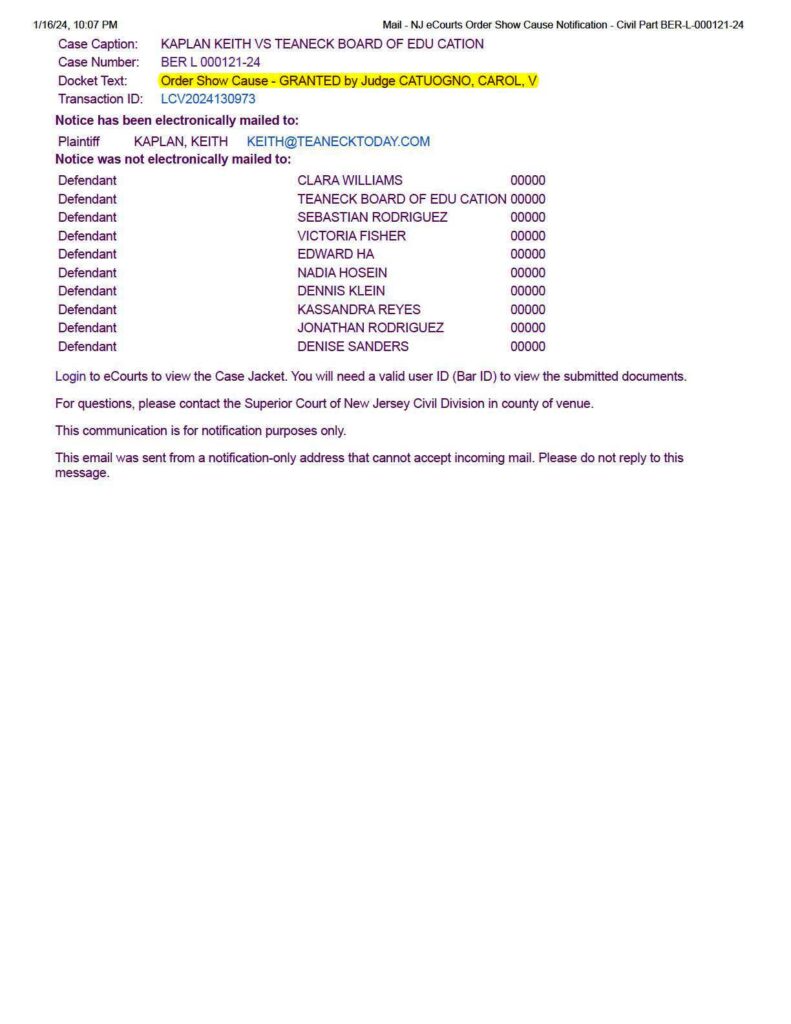An open email to the Teaneck Board of Education and District:
BER-L-000121-24 Keith Kaplan v. Teaneck Board of Education, et al.
The Teaneck Board of Education has problems.
There’s the Federal investigation into Civil Rights Violations by the Office of Civil Rights
There’s the Foundation for Individual Rights and Expression Investigation and charges of Civil Rights Violations
(First Letter from FIRE) (Second Letter from FIRE)
And now, there’s a Superior Court action for multiple violations of the Open Public Meetings Act (NJ’s signature transparency law)
I called several of the OPMA violations out at meetings, including the failure to abide by the minimum requirements of transparency–sending notice to two newspapers. The First Amendment organization FIRE (Foundation for Individual Rights and Expression) has called them out for Civil Rights violations, not once, but TWICE. And the Feds are investigating the District.
Sadly, there’s no sign that the illegal and improper activities that the Trustees of the Board of Education and the Administration in Teaneck have been engaged in, will be ending on their own.
So I have filed a Verified Complaint and an Order to Show Cause against the School District. Today, the Order was granted by Judge Catuogno.
I do not take this step lightly. However the law requires certain actions, and they have not been taken. To wit:
- Properly Noticing Meetings / Agendas
The Open Public Meetings Act requires that the public receive notice of meetings, in advance. The requirements have existed since the 1970s. Our staff are trained in the requirements. The trained staff have attorneys reviewing their work.- Annual Notice: The Board is allowed to send an Annual Notice at the beginning of the year. They merely have to send the notice to two Newspapers. They can update it, if necessary. Once they do that, they are good for the rest of the year, unless they add “Special Meetings” which will require Notice, as well.
N.J. Stat. § 10:4-18 says: “At least once each year, within 7 days following the annual organization or reorganization meeting of a public body, or if there be no such organization or reorganization meeting in the year, then by not later than January 10 of such year, every public body shall post and maintain posted throughout the year in the place described in subsection 3. d.”
It’s currently past January 10th and the District has NOT yet sent out the annual notice. It’s beyond the statutory deadline. Again, this is the MINIMUM required disclosure. Therefore, the District must notice EACH meeting throughout the year, and cannot rely on the Annual Notice provision. - Special Notice: When a Notice is sent for a “Special Meeting”, such as the meeting the Board called on December 21st, where they removed Principal Valdes from THS, they are required to abide by the Notice requirements, which include (among other things) an agenda or list of topics “to the extent known” which will happen at the meeting.
We know this didn’t happen because Principal Valdes received a RICE notice (a required notice sent to any staff member when they are going to be discussed at a meeting) and he asked for the discussion to take place in the open session of the Board of Education meeting (as is his right under RICE). For those reasons, the Board knew (remember, the requirement is “to the extent known”) that they would be discussing his employment. They could have, but didn’t, include that on the Notice or Agenda, for the Special Meeting.
- Annual Notice: The Board is allowed to send an Annual Notice at the beginning of the year. They merely have to send the notice to two Newspapers. They can update it, if necessary. Once they do that, they are good for the rest of the year, unless they add “Special Meetings” which will require Notice, as well.
- Not Allowing Secret Votes:
The Open Public Meetings Act lets a Board of Education or Township Council go into closed session for certain types of discussions (9 categories of closed session topics can be found in N.J. Stat. § 10:4-12). But even when they go into closed session, the law doesn’t let them VOTE in closed session.
Section (b) states: “A public body may exclude the public only from that portion of a meeting at which the public body discusses… [list of criteria]“. That’s intentional. The Open Public Meetings Act requires votes to be taken in public, even if the discussion must remain private. If the Board votes in private, without a corresponding public vote, it’s a violation. It’s a secret vote the public doesn’t know about. Secret votes shouldn’t be allowed to happen if a Board or Council abides by the Open Public Meetings Act.
Here’s why:- The Board must indicate via Resolution what they are discussing in Closed Session (to the extent possible). To have a secret vote, they have to NOT abide by the rule to inform the public of what they are meeting about.
- The minutes must be provided, which show the votes. Closed Session minutes must be provided to anyone asking for them. To maintain a Closed Session vote that no one knows about, the District would also deny a request for minutes to the public, in violation of the Open Public Records Act. We know this has been happening because the Board voted in Closed Session to send me a letter, ostensibly about the way I comported myself on October 18th. The substance of the letter is not my point here. The point I’m making is that the evidence the vote took place in closed session WAS the fact I received a letter. Had the Board voted not to send one, the vote still would have violated the Open Public Meetings Act, but I never would have known to ask about it. And when I did ask for Closed Session minutes, the three dates I asked about were denied. Why? Because the District claims that I need to include a topic I’m inquiring about. The law says otherwise.
- Not Allowing Knowing Violations
- If you violate the Open Public Meetings Act by accident, it’s typically not the biggest deal in the world. You make it up by re-voting on the issue at a properly noticed meeting. The only time you really have a problem is if you actively violate the act, knowingly.
- On January 3rd, 2023, after repeatedly being told that the Board of Education was violating the Act, the proper thing to have done would have been to adjourn the meeting and properly notice another one, within three days2. But the meeting instead opened and proceeded VERY differently. The Board Administrator opened the meeting, not with the Open Public Meetings Act Statement1, which has become the default statement at every meeting in all of NJ’s 565 municipalities for the last half Century, but an admission — that the Board didn’t properly notice the meeting. Then, they proceeded to run the meeting, stating that because it wasn’t properly noticed, they’d just re-vote everything again at the next meeting. This was a knowing and active violation of the transparency rules in the State of NJ. It shows exactly what they do when they know that they are breaking the rules.
Watch them say it:
If you violate the law and say it doesn’t matter, don’t be surprised if a Judge doesn’t see it the same way.
There’s a chance to fix this. I hope the district does so. Otherwise, I’ll see you in court.
Case documents can be found here:
KAPLAN v. TEANECK BOARD OF EDUCATION, et al. BER-L-000121-24
1. Since 1976, when the Open Public Meetings Act went into effect, these words have started almost every meeting in all of the 565 municipalities of NJ:
“Adequate notice of this meeting has been provided by Resolution No. 14-2023, sending a copy to the newspapers officially designated for 2023 by way of Resolution No. 2-2023, filing a copy in the Township Clerk’s Office and posting it on the Municipal Building bulletin board, and the Mayor hereby directs that this statement be included in the minutes.”
– Notice Statement as found in Minutes of the Teaneck Municipal Council (link)
2. Notably, the BOE stated at the Jan 3 meeting that it does not intend to hold a meeting until January 17, 2024. This is outside the statutorily required period permitted by law, which requires that the reorganizational meeting be held within the first week of January. See N.J.S.A. 18A:10-3(c). This statute requires that when a reorganizational meeting cannot be validly held by reason of a lack of quorum “or any other reason,” a make-up meeting must be held within three subsequent days. While the acts of the BOE may be ratified at a later meeting, by failing to hold a valid and properly noticed reorganizational meeting at all, the BOE is now admitting that it is violating N.J.S.A. 18:10-3(c).
2024-01-16_Email from K Kaplan to BOE and District_NJ eCourts Order Show Cause Notification - Civil Part BER-L-000121-24_1 2024-01-16_Email from K Kaplan to BOE and District_NJ eCourts Order Show Cause Notification - Civil Part BER-L-000121-24_2
